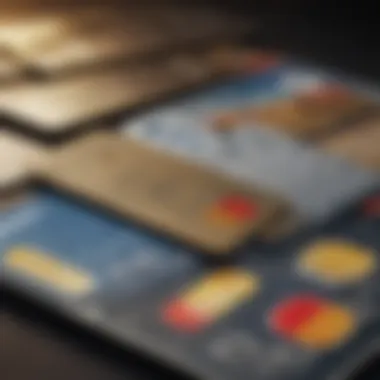Understanding Credit Cards for Major Purchases


Intro
Making big purchases often requires a significant financial commitment. Credit cards are a common tool used for these transactions. However, understanding how they impact your financial situation is crucial. This article will shed light on various aspects of using credit cards for large purchases. It will also help you make informed decisions about whether to use credit or explore alternatives.
Understanding Credit Scores
Having a good credit score matters, especially when considering large purchases. Your credit score reflects your creditworthiness and can affect your ability to secure financing or favorable terms on future purchases. A good score can lead to lower interest rates and better credit card rewards.
Importance of Credit Scores
Credit scores are essential indicators of financial health. They determine your eligibility for loans, how much interest you will pay, and can even influence non-financial aspects like rental application approvals. A high credit score shows lenders that you can manage credit responsibly.
Factors Affecting Credit Scores
Several factors contribute to your credit score:
- Payment history: Timely payments boost your score.
- Credit utilization: Keeping your usage below 30% of your limit is ideal.
- Length of credit history: Longer histories often yield higher scores.
- Types of credit: A mix of credit types can positively influence your score.
- New inquiries: Too many new applications in a short span can lower your score.
Tips to Improve Credit Scores
Improving your credit score requires consistent efforts:
- Pay bills on time.
- Reduce outstanding debt.
- Avoid opening multiple new accounts at once.
- Order your credit report to identify errors and correct them.
- Keep older accounts active to maintain a long credit history.
Exploring Credit and Identity Theft Protection Options
Using credit cards for big purchases raises concerns about security. Identity theft is a significant risk that can affect your finances and credit score.
Types of Credit Products Available
Various credit products can help you manage large expenses:
- Rewards credit cards: Offer points or cash back for purchases.
- Low-interest credit cards: Provide lower rates for large purchases.
- Balance transfer cards: Allow you to move existing debt to a card with lower interest.
Comparison of Credit Monitoring Services
Monitoring your credit can help mitigate identity theft risks. Some popular services include Experian, TransUnion, and Credit Karma. Each service offers different features, such as:
- Regular credit report updates.
- Alerts for suspicious activities.
- Credit score tracking.
Steps to Protect Against Identity Theft
Protection against identity theft is paramount. Here are measures you can take:
- Use strong, unique passwords for online accounts.
- Enable two-factor authentication where possible.
- Monitor your accounts regularly for unauthorized transactions.
- Keep personal information confidential and secure.
Debt Management Strategies
Responsible credit card usage can prevent the accumulation of excessive debt. Developing a solid debt management strategy is vital.
Different Ways to Consolidate Debt
Debt consolidation can simplify your payments:
- Personal loans: A single loan can pay off multiple debts.
- Home equity loans: Use your home's equity to pay off credit card debt.
- Credit card balance transfers: Move debt to a card with a lower interest rate.
Creating a Personalized Debt Repayment Plan
A tailored plan helps keep your payments organized:
- List all debts with balances and interest rates.
- Choose a repayment strategy, like the snowball or avalanche method.
- Set monthly payment amounts and stick to them.
- Track your progress to stay motivated.
Negotiating with Creditors for Better Terms


Consider reaching out to creditors for assistance. Request lower interest rates or flexible payment terms. Many companies are willing to negotiate, especially if you have been a loyal customer.
Savings Advice for Financial Well-Being
Building a solid financial foundation through savings remains crucial.
Importance of Building an Emergency Fund
Having an emergency fund can prevent you from relying solely on credit:
- Aim for 3-6 months of living expenses.
- Keep this fund in an accessible savings account.
Automated Savings Techniques
Automating savings can simplify the process:
- Set up automatic transfers from checking to savings.
- Use apps that round up purchases and save the difference.
Investing Tips for Long-Term Financial Goals
Consider these guidelines for investments:
- Start investing early to take advantage of compound interest.
- Diversify your investment portfolio to reduce risk.
- Regularly review your investment strategy to align with goals.
Understanding credit cards and their implications can lead to smarter financial choices in big purchases.
By grasping these concepts, individuals can navigate their financial decisions more effectively.
Prolusion to Credit Card Utilization
The use of credit cards is fundamental in today's financial landscape. They serve not just as a means of payment, but as a tool for managing finances and building credit history. Understanding how to effectively use credit cards is especially crucial when it comes to making significant purchases. This article aims to provide insights into this subject, exploring both the benefits and drawbacks.
The Role of Credit Cards in Modern Transactions
Credit cards offer a convenient way to make purchases. Instead of carrying cash, consumers can make transactions using plastic. This ease of use has led to increased reliance on credit cards for everyday spending. According to recent studies, a substantial portion of consumers prefer credit cards due to added features like buyer protection and fraud alerts.
Moreover, credit cards play a significant role in facilitating larger transactions. When individuals require high-value items, such as electronics or appliances, credit cards provide immediate access to funds, allowing for instant gratification. They also open the door to rewards programs that can give back a percentage of the spending.
However, it is vital to note that using credit cards impresses priority on the user’s understanding of their financial health. Rethinking personal spending habits can help mitigate risks associated with debt accumulation. This makes the topic relevant for individuals planning to leverage credit for major purchases.
Understanding Credit Limits and Their Significance
A credit limit is the maximum amount a cardholder can borrow on their credit card. It can vary based on several factors, including income, credit score, and the lender's policies. Understanding this limit is essential before making any big purchase. Exceeding a credit limit can lead to fees, declined transactions, or even a negative impact on your credit score.
Establishing a proper credit limit allows consumers to plan their finances better. It helps in budgeting for purchases while keeping in check the cumulative expenses. Users should regularly monitor their credit utilization ratio, which is the amount of credit used compared to their total credit limit. Maintaining a low ratio is often advisable, as it reflects responsible credit management.
Big Purchases and Their Financial Implications
Using credit cards for big purchases is a significant decision in personal finance management. Understanding the financial implications of these transactions is crucial for making informed choices. Big purchases can affect one's credit score, overall debt, and financial stability. Therefore, examining the financial implications helps individuals prepare and manage their finances better.
Defining a Big Purchase
A big purchase generally refers to any expense that exceeds a certain threshold, which can vary based on individual circumstances. Typically, anything priced over a few hundred dollars can qualify as a big purchase. This includes items like furniture, electronics, vehicles, or home renovations.
For some, even a vacation or a medical expense may fall into this category. Defining what constitutes a big purchase is subjective but central to understanding its financial impact.
Common Types of Big Purchases
When considering big purchases, it is important to recognize common categories. These include:
- Home Appliances: Refrigerators, washers, and dryers can add up quickly.
- Electronics: Items like laptops, televisions, and smartphones often have high price tags.
- Transportation: Cars and motorcycles are usually major expenses for individuals.
- Travel Experiences: Vacations, flights, and hotels can become significant financial commitments.
- Health-Related Expenses: Medical procedures and treatments are often unexpected and costly.
These categories highlight the various aspects of life where big purchases play a role. Understanding these categories can help individuals prioritize and evaluate their spending.


Evaluating the Necessity of a Big Purchase
Before making a big purchase, evaluating its necessity is essential. Ask critical questions:
- Is this item or service essential? Reflect on whether it is a need or simply a want.
- Can it wait? Consider if delaying the purchase helps save money or allows for better planning.
- What are the consequences of not purchasing? Weigh the potential impact of not making the purchase against the cost.
This evaluation process fosters responsible spending habits. Scrutinizing each potential big purchase will help ensure that financial decisions align with overall financial goals. By being thorough, individuals can avoid unnecessary debt and enhance their financial security.
Advantages of Using Credit Cards for Big Purchases
Using credit cards for big purchases offers various advantages that can significantly enhance the buying experience. These benefits cater not only to convenience but also to financial management. Understanding these implications can help individuals make informed decisions that align with their purchasing habits and financial goals.
Convenience and Accessibility
Credit cards provide a level of convenience that cash or checks simply cannot match. When making a large purchase, the ability to swipe a card allows for quicker transactions, saving time and effort. This is particularly relevant in scenarios where immediate payment is required, such as at car dealerships or electronics retailers.
Additionally, credit cards can be advantageous in situations where a buyer does not have sufficient liquid cash available. This accessibility can enable consumers to make necessary purchases without delay. For instance, if an emergency arises, such as a home repair, having the option to use a credit card can prevent potential disruption in daily life.
Furthermore, many credit cards offer additional features like extended warranties or purchase protection. Such features can provide peace of mind, knowing that major purchases are safeguarded. This added layer of security encourages consumers to confidently shop for larger items.
Rewards Programs and Benefits
Another compelling reason to use credit cards for big purchases is the rewards programs that many issuers provide. Consumers can take advantage of cash back, points, or travel rewards, which can add value to their transactions. For instance, a credit card that offers 2% cash back on purchases can present a significant return when used for a large expenditure such as furniture or vacations.
The accumulation of rewards can also lead to future savings. Consumers often find themselves with enough points or cash back to offset upcoming costs, which can enhance overall financial health. This allows individuals to view large purchases not just as expenses but as opportunities to earn benefits.
Moreover, many credit cards have promotional offers that can result in interest-free periods for large purchases. This can enable consumers to pay off the amount over time without accruing additional interest, making it easier to manage cash flow. However, it is crucial to read the terms and conditions to understand the implications of these offers. They can vary significantly between different issuers.
Using credit cards wisely can make large purchases more manageable while providing rewards that help offset costs down the line.
Risks Involved in Big Purchases with Credit Cards
Using credit cards for large expenditures can seem like a convenient approach. However, it is crucial to understand the associated risks. These risks encompass potential negative impacts on one’s credit score, risks of accumulating debt, and the strain on personal finances. Recognizing these dangers is an important step in making informed decisions about credit usage. Ignoring these aspects can lead to significant financial troubles down the line.
Potential Impact on Credit Score
A credit score is a numerical representation of an individual’s creditworthiness. It reflects how well a person manages their credit accounts and debts. When using a credit card for a big purchase, your credit utilization ratio plays a crucial role. This ratio is calculated by dividing the total amount of credit card balances by the total credit limits. A high credit utilization ratio, typically over 30%, may lead to a lowering of one’s credit score. This is because lenders view high usage as a sign of financial distress. The potential impact may linger on your credit report for years, affecting future borrowing capabilities.
Debt Accumulation and Interest Rates
Big purchases can often lead to significant debt. This is especially true if the cardholder does not pay off the balance quickly. Credit cards usually come with high-interest rates, which can compound rapidly if the balance is carried over month after month. As debts increase, more money is spent on interest rather than the principal balance, deepening financial issues. Understanding the terms of your credit card agreement, including the Annual Percentage Rate (APR) and associated fees, is imperative for avoiding prolonged periods of debt.
Understanding Financial Strain
The emotional and psychological toll that debt can take is often overlooked. Large purchases can disrupt personal budgets, leading to stress and anxiety about finances. The pressure to meet monthly payment obligations may constrain spending in other areas of life, raising concerns about overall financial stability. Furthermore, if unexpected expenses arise, an increased debt load means less available credit for emergencies. Therefore, maintaining a clear understanding of one’s financial capacity is essential to mitigate stress caused by debt.
"The true cost of a purchase goes beyond its price tag; it includes the long-term financial implications and emotional impact on your life."
To summarize, the risks associated with using credit cards for big purchases are multifaceted. They encompass potential effects on credit scores, the danger of significant debt accumulation, and the strain on one’s overall financial health. Evaluating these risks carefully can empower consumers to make informed and responsible financial decisions.
Making Informed Decisions Regarding Big Purchases
Making informed decisions regarding big purchases is critical in today's financial landscape. When utilizing credit cards for significant transactions, understanding the implications ensures that individuals do not inadvertently jeopardize their financial future. This section emphasizes the importance of thorough evaluation and preparation before engaging in large purchases, considering both immediate desires and long-term financial health.
Assessing Financial Readiness
Assessing financial readiness is the first step in making informed decisions about big purchases. Before charging a large amount on a credit card, it is essential to take stock of one’s current financial situation. This includes examining income, existing debt, and overall spending habits. Key points to consider include:
- Evaluating monthly income against expenditures.
- Reviewing credit card bills and any outstanding balances.
- Considering whether a big purchase aligns with future financial goals.
By undertaking this assessment, individuals can determine if they have the capacity to manage additional costs without straining their finances. For instance, if high-interest debt already exists, it may be wiser to delay new purchases until it is reduced or paid off. Mismanaging expenses can lead to cascading financial issues in the future, underscoring the need for careful evaluation.
Setting a Budget


Setting a budget is another crucial aspect of informed decision-making. A well-planned budget helps to allocate funds judiciously, ensuring that large purchases do not disrupt financial stability. Here are some steps to follow when establishing a budget for big purchases:
- Identify Total Costs: Determine the full cost of the purchase, including taxes, fees, and any future maintenance or operation expenses.
- Compare Income and Expenses: Analyze current cash flow to understand how much money can be allocated towards the purchase.
- Factor in Emergency Savings: Ensure that sufficient funds are left for unexpected expenses post-purchase.
- Explore Payment Options: Consider various payment strategies, such as paying in full to avoid interest, or spreading payments out if necessary while aiming to minimize the overall cost.
"A budget is not just about limiting expenditure; it’s about understanding your financial possibilities and making empowered choices."
Creating a budget increases the likelihood of making prudent decisions that align with personal financial goals. Thus, informed budgeting can present a significant benefit, allowing consumers to enjoy their purchases without the burden of excessive debt or financial distress.
Credit Card Alternatives for Big Purchases
When considering large financial commitments, it's paramount to evaluate alternatives to credit cards. The use of credit cards for significant transactions can lead to various concerns like high interest rates and impacts on credit scores. Exploring alternatives provides options that may better align with personal financial circumstances, reducing the risk of debt accumulation.
Personal Loans as an Option
Personal loans furnish a viable alternative to credit cards for financing big purchases. Unlike credit cards, which often come with high interest rates and fluctuating payments, personal loans typically offer a fixed interest rate over a specific term. This results in predictable monthly payments that can make budgeting easier.
- Loan Amounts: Personal loans give borrowers flexibility in choosing the amount they need, helping to cover the cost of larger purchases.
- Repayment Terms: Most personal loans come with structured repayment periods, allowing consumers to manage their finances without the risk of endless revolving debt.
- Credit Score Impact: An installment loan can boost one’s credit score when paid on time, as it adds to the credit mix.
However, it is important to shop around for the best rates and terms. Lenders like SoFi, Marcus by Goldman Sachs, and LightStream are often recognized for their competitive offers. Additionally, transparency regarding fees is crucial; reading the fine print helps avoid unforeseen charges.
Layaway Plans Explained
Layaway plans are another alternative offering a method to pay for an item in installments before taking possession of it. Many retailers provide this payment option for high-value items. This method allows buyers to secure their purchase at the current price while paying over time. It helps avoid debt because consumers are not using credit cards or loans.
- Item Reservation: The retailer holds the item until it is fully paid, eliminating the risk of price increases.
- Affordability: Layaway plans often come with no interest fees, which can make them financially favorable for buyers who prefer to pay in smaller increments.
- Control Over Spending: Shoppers can only spend what they can afford, promoting better financial habits.
However, customers must consider the payment terms. Not all layaway plans are created equal, some may have strict policies on fees or timelines. Always ask about the terms to ensure it meets individual financial situations.
Strategies for Responsible Credit Card Use
Responsible credit card use requires a principled approach to maximize the benefits while minimizing potential downsides. By establishing specific strategies, consumers can navigate the complexities of credit card management effectively. This section will detail practical methods individuals can apply to ensure their credit card usage does not lead to financial complications.
Maintaining a Low Credit Utilization Ratio
Credit utilization ratio is a crucial aspect of credit scores. It refers to the amount of credit used compared to the total available credit. Keeping a low credit utilization ratio is essential for maintaining a healthy credit score. Generally, a ratio below 30% is advised, but lower is better. Here are some strategies for keeping it low:
- Monitor your balances: Regularly check your current balances against your credit limit.
- Increase your credit limit: If possible, request a higher limit from your credit card issuer. This can lower your ratio without needing to change your spending behavior.
- Pay off charges quickly: Try to pay off any purchases soon after making them rather than leaving a balance until the due date.
A lower credit utilization ratio does not just help in maintaining a good credit score; it also demonstrates to lenders that you can manage your credit responsibly.
Paying Off Balances Regularly
Paying off credit card balances regularly is one of the most effective methods to avoid falling into debt. It is vital to develop a habit of paying the balance in full each month to avoid interest charges. Some tips to achieve this are:
- Set reminders for payments: Use digital calendars or financial apps to ensure you never miss a due date.
- Automate payments: Many credit card companies offer automatic payment features. If your budget allows, automatically pay the full balance each month.
- Create a payment schedule: Besides the due date, consider paying more frequently throughout the month. This reduces the balance quicker than a single monthly payment.
Regular payments not only help you bypass accumulating interest but also improve your credit score significantly over time.
Understanding Billing Cycles and Due Dates
A clear understanding of billing cycles and due dates is critical for effective credit card management. Recognizing when your billing cycle begins and ends can help you better plan your purchases and payments. Key points to consider include:
- Billing cycle specifics: Learn how long your billing cycle is. It often lasts about 30 days but can vary by issuer.
- Due date awareness: Identify the exact date your payment is due. This helps in planning when to make payments and in avoiding late fees.
- Grace periods: Some cards offer grace periods which allow you time to pay without incurring interest. Familiarize yourself with these terms to make the most of your credit.
Understanding these elements minimizes unexpected fees and enhances your overall financial management.
Knowledge of how to effectively manage credit cards can significantly impact your financial health.
Ending
In the context of this article, concluding thoughts on using credit cards for big purchases are pivotal. The implications of relying on credit cards for hefty expenses can shape one's financial future in significant ways. Recognizing these effects demands a careful approach to credit card utilization, especially when contemplating major transactions.
Recapping key takeaways is essential for readers to consolidate their understanding. Utilizing credit cards for large purchases can deliver immediate benefits, such as convenience and potential rewards. However, the associated risks, including impacts on credit scores and potential debt accumulation, are stark. Balancing these factors is crucial. A thorough comprehension of one's financial capacity, coupled with strategic planning, can mitigate adverse outcomes.
Moreover, emphasizing financial literacy among individuals is a step vital to making informed decisions. Knowledge about credit card terms, interest rates, and the broader implications of credit utilization empowers consumers. This understanding can steer individuals away from impulsive choices and towards a well-informed financial strategy. An informed consumer is well-equipped to leverage credit positively and avoid pitfalls that could jeopardize financial stability.
"Financial literacy is not just about knowing numbers; it’s about understanding the impact of those numbers on your life."
By engaging thoughtfully with credit cards, individuals can enhance their financial well-being instead of endangering it. This article encapsulates key insights and practical guidance, encouraging readers to approach credit with both caution and confidence.



